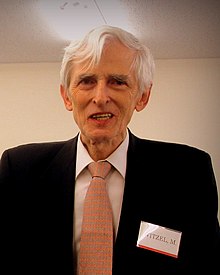Michael Witzel
Michael Witzel (born July 18, 1943 in Schwiebus ) is a German Indologist . Since 1986 he has been teaching as Wales Professor of Sanskrit at Harvard University (USA). Witzel is editor of the Electronic Journal of Vedic Studies and the Harvard Oriental Series .
Life
Witzel studied Indology in Germany a. a. with Paul Thieme and Karl Hoffmann , later in Nepal with Mimamsaka Jununath Pandit. He led research projects in Kathmandu and taught Sanskrit in Tübingen and Leiden since 1972 and at Harvard University since 1986 . In the meantime he worked as a guest lecturer in Kyoto , Paris and Tokyo .
research
Witzel's early philological work is particularly concerned with ancient Vedic texts, for which he created editions and translations. Together with Toshifumi Gotō, he also undertook a new transmission of the Rig Veda , the first part of which (1st and 2nd circle of songs) was published in 2007 by the newly founded publishing house for world religions.
In his studies he examined various Vedic text editions and their importance for the spread of Vedic culture in northern India and dealt with Vedic dialects.
In addition to other research subjects, Witzel concentrated increasingly on ancient Indian history since 1987 and carried out studies partly in collaboration with archaeologists from Harvard University. In addition, there was a thorough research into the linguistic aspect of the oldest Indian history, in which he dealt with pre-Vedic languages and the loanwords taken from them in several articles .
Debate on Indo-Aryan Migration
Witzel wrote articles on the subject of Indo-Aryan migration and firmly rejected the out-of-India theory of Shrikant G. Talageri, Koenraad Elst and others. In “Autochthonous Aryans? The Evidence from Old Indian and Iranian Texts ”he went into detail on the theses of the proponents of a model of the original home of the Aryans in India and rejected them on the basis of philological arguments.
In 2002/03, the Indologist Nicholas Kazanas, for the first time a representative of indigenous theory, had the opportunity to present his theses in the Journal of Indo-European Studies . As an exception, a peer review was dispensed with. The editor James Patrick Mallory gave as the reason that, in view of the strongly emotional debate, no mainstream Indologist would be available to take on this task with a neutral and impartial view. So he decided to reprint the article, accompanied by nine critical responses from reviewers, to which Kazanas was allowed to reply again. In 2003, however, Witzel criticized this publication and accused the editor that the Indian nationalists could refer to it in future and use it as a great gain in prestige.
California textbook controversy
In 2005, Witzel joined in a debate over some changes in California textbooks that American Hindus had proposed to portray the origins of ancient Indian history more in their favor than - as they see it - representatives of the Indian population. Witzel, who received support from academic Indologists, was appointed head of a group of experts, which critically reviewed the planned changes and finally reached a compromise. Witzel saw the originally planned corrections as a plan by Hindu nationalists who were pursuing the plan to rewrite the history of India for political and ideological reasons.
"Laurasian Mythology"
In his work The Origins of the World's Mythologies , Witzel postulates a common Paleolithic origin of the myths of Eurasia and North America, which are said to have spread through diffusion with the spread of humans . He symbolically describes these myths of the northern hemisphere (with the term for the northern part of the supercontinent Pangea, which was broken up in the Mesozoic ) as " Laurasian ", while he describes the even older myths of the Sub-Saharan , Andaman , Australian and Melanesian as "Gondwanian" (after the southern Part).
literature
- Rig Veda. The sacred knowledge. First and second circle of songs. Translated from Vedic Sanskrit and edited by Michael Witzel and Toshifumi Goto with the assistance of Eijiro Doyama and Mislav Jezic. Frankfurt: Publishing House of World Religions. 2007, pp. 1–889 (first complete translation into a western language since Karl Friedrich Geldner's 1929/51).
Web links
Individual evidence
- ^ In: Electronic Journal of Vedic Studies 2001. Online (pdf)
- ^ EJ Michael Witzel: The Origins of the World's Mythologies. Oxford University Press, New York 2012.
| personal data | |
|---|---|
| SURNAME | Witzel, Michael |
| BRIEF DESCRIPTION | German Indologist |
| DATE OF BIRTH | July 18, 1943 |
| PLACE OF BIRTH | Schwiebus |
